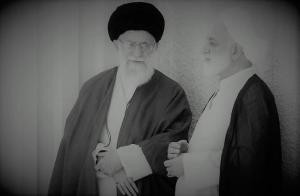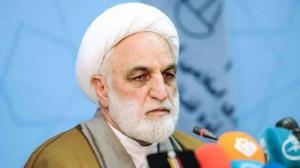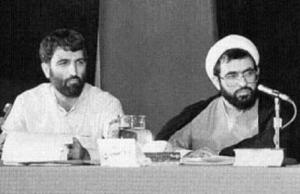
Ejei is one of the most vicious figures of the mullahs’ regime and is sanctioned by the European Union and the United States for his role in oppressing the Iranian people.
By installing Ejei, Khamenei completed the project to consolidate his regime for which he had started preparing two years ago.
Today, Khamenei, the regime’s Supreme Leader, appointed cleric Gholam-Hossein Mohseni Ejei, as the Judiciary Chief, replacing Ebrahim Raisi. With the appointment of Mohseni Ejei, Khamenei completed the project of consolidating his regime, which he had begun two years ago in fear of popular uprisings. In this way, he completed implementing the “Hezbollahi government” project, about which he had talked in May 2019.
Mohseni Ejei has been involved in executions, torture, and murder for nearly four decades in intelligence, security, and judicial positions and is, by any definition, considered a crime against humanity. He was in charge of human resources in the Ministry of Intelligence from 1985 to 1988. During the 1988 massacre, he was the representative of the Judiciary in the Ministry of Intelligence. From 1995 to 1997, he was the Special Prosecutor of the Tehran Clerical Court. From 1998 to 2005, he was the Special Prosecutor of the Clergy. From 2009 to 2014, he was the Attorney General, and from 2014 until today, he has been the Deputy Judiciary Chief, playing a criminal role in 2009, 2018, and 2019 uprisings.
Mohseni Ejei was directly involved in the “serial killings” in 1998 and personally ordered the murder of one of the victims. As the prosecutor of the Special Court for the Clergy, during the weekly meeting of the Press Supervisory Board with the representative of the press directors, he threw a sugar container at him and bit his ear and shoulder.
When the Iranian regime was considering his appointment as the Minister of Intelligence on August 22, 2005, Ejei said: “I know more or less the anti-regime and counter-revolutionary political groups that are working to overthrow the regime and disrupt the system, and I have been at odds with them at times, which is also a good asset for my function at the Ministry of Intelligence.”
According to IRNA news agency, on December 8, 2009, during the student uprising on December 7, 2009, he warned, “From today, we will not give respite to those who disrupt the order and security of society,” and “I also tell families to watch their children to not be deceived by foreigners or ambiguous slogans. If they are deceived, families should not complain by saying that my son was only a student, why was he arrested… Henceforth, we will lose no opportunity and there will be no neglect.” In an interview with the state-run television, he threatened that protesters who do not repent would face the death penalty.
He has a long history of covering up crimes, sexual assaults, and financial corruption by Khamenei’s cronies. For example, in covering up the sexual scandal involving Saeed Tusi, Khamenei’s special reciter, he threatened the media. IRNA quoted him on November 24, 1995, as saying, “It is a crime to cover the story while he has not been convicted. Journalists could be prosecuted,” adding: “Saeed Tusi’s trial must not be held in public because the counter-revolutionaries seek to take advantage of the case.”
Ejei was blacklisted by the US Treasury Department in October 2010 and by the European Union in April 2011 for his role in suppressing the 2009 uprising.
Commenting on Ejei’s appointment, Mrs. Maryam Rajavi, the President-elect of the National Council of Resistance of Iran (NCRI), said: By installing Ejei, Khamenei completed the project to consolidate his regime, putting in place a “Hezbollahi government,” for which he had started preparing two years ago. By purging rival factions and taking full control of the three branches of power, Khamenei is trying in vain to delay the regime’s inevitable overthrow but will only provoke popular rage and disdain. All three heads of the branches (Ebrahim Raisi, Mohammad Bagher Qalibaf, and Mohseni Eje’i) must be brought to justice for genocide and crimes against humanity.
Secretariat of the National Council of Resistance of Iran (NCRI)
July 1, 2021
In this article, we intend to take a look at Ejei’s background:
Who Is Gholamhossein Mohseni Ejei, Iran’s New Judiciary Chief?
Executive Summary
Iran’s sham presidential election ended on June 19, 2021. The Iranian regime’s supreme leader, Ali Khamenei, appointed the regime’s Judiciary Chief, the notorious Ebrahim Raisi as the regime’s new president. Days after Raisi’s selection, Gholamhossein Mohseni Ejei became the regime’s new Judiciary Chief.
Ejei is one of the most vicious figures of the mullahs’ regime and is sanctioned by the European Union and the United States for his role in oppressing the Iranian people. With Raisi as president and Ejei as the Judiciary Chief, Khamenei confirmed his decision to pursue his policy to consolidate his regime in the face of a restive society and increase oppression to control this explosive society.
Get to know Gholam-Hossein Mohseni-Ejei
Mohseni-Ejei was born in Ezhiyeh, Isfahan, Iran in 1956. He is a graduate of the Haqqani school in Qom, where most of the regime’s top officials and clerics had studied.
Ejei became close to the regime’s founder, Ruhollah Khomeini, and his ilk before the 1979 revolution through the would-be regime’s officials in Haqqani school.
Following the 1979 revolution, Ali Ghodussi, one of the regime’s most criminal judiciary officials and the so-called “Attorney General of the Islamic Revolution,” invited Ejei to Tehran, where he started to work in the so-called Islamic Revolution Court.
Due to his cruelty, Ejei soon reached top positions in the regime and has been involved in human rights violations for years.
During the 1980s, Ejei held various positions, such as the Representative of the Revolutionary Prosecutor in the regime’s Ministry of Intelligence and Security (MOIS) and the Chief of the Revolutionary Court’s 3rd Circuit. He was the head of the MOIS Select Committee from 1984 to 1985.
Ejei became the Representative of the Head of Judiciary to MOIS in 1986 and remained in this position until 1988.
Thus, he had a significant role in arrests, torture, and executions of dissidents and in issuing execution orders of thousands of political prisoners, especially during the 1988 massacre of political prisoners in Iran.
The Representative of the MOIS had a definitive role in all death commissions and pushed the commissions to increase the number of executions. In effect, they were the eyes, ears, and arms of the henchman. As Montazeri has said: “He [Khomeini] would receive various reports from Intelligence Ministry officials … he would treat these reports as divine truth.”
The memoirs of then-intelligence minister Mohammadi Reyshahri include several letters exchanged between him and Khomeini, verifying that Khomeini directly led the ministry to carry out the crimes. In his book, Reyshahri also confesses to the suppression of Montazeri’s inner circle, saying: “We referred to him even for the smallest matters.”
As the Deputy Prosecutor of the Special Court of Clergy in 1995 and as the Prosecutor of the Special Court of Clergy since 1999, Ejei played a role in the arrest, imprisonment, and execution of many dissidents clergies in Iran.
In the 1990s, Ejei also played a significant role in the so-called “chain killings” of Iranian intellectuals and writers. He was subsequently appointed as the intelligence minister (2005-2009) and the prosecutor general (2009-2014).
As the Minister of Intelligence, Ejei was one of the highest-ranking officials in the mullahs’ regime responsible for executions, killings, and torture in the country. During this period, a large number of prisoners were executed in the regime’s many torture chambers and prisons.
Before becoming the regime’s Judiciary Chief, he was the first deputy of the Judiciary and a member of the Expediency Council.
In a press conference in Tehran on Tuesday, June 18, 2019, Ejei, then the regime’s First Deputy Judiciary Chief, announced that Khamenei had increased the level of authority he enjoys, permitting him to now hand down death sentences.
Based on articles 477 and 350 of the Iranian regime’s penal code, the Supreme Leader has authorized the Judiciary Chief to issue sentences of death and ‘Qisas’ (retribution) under the regime’s so-called Sharia law, to punish criminals with the same crime they have committed. Ejei said that the First Deputy Judiciary Chief has the same authority from now on and can decide over death and Qisas sentences.
Within the last two-and-a-half months, these changes facilitated the conclusion of more than 600 cases of Qisas and execution, he said, the state-run ISNA news agency reported.
Yet Ejei did not say how he concluded the cases – whether he confirmed all the death and Qisas sentence or not. He called this action a “revolutionary Jihadi act” by Judiciary Chief Ebrahim Raisi.
On April 13, 2011, the European Union imposed sanctions on 32 Iranian officials, including Ejei, and banned them from entering EU countries for grave violation of human rights.
On September 29, 2010, the US Treasury Department imposed sanctions on Ejei for committing serious human rights violations, and the statement from the Department pointed to his involvement in “the suppression of protests after the 2009 elections”. And under these sanctions, it was decided to seize Gholamhossein Mohseni Ejei’s potential assets in the United States and ban him from entering the country so that American citizens could not do business with him as well.
Conclusion
The regime’s new president, Ebrahim Raisi, is one of the main culprits of the 1988 massacre of 30,000 political prisoners, of which the majority were members of the People’s Mojahedin Organization of Iran (PMOI/MEK). With Ejei as the judiciary chief, the regime has confirmed its decision to increase human rights violations.
Both Raisi and Ejei are under sanctions for their role in human rights violations. The emergence of these criminals as the regime’s top officials is part of the systematic impunity they enjoy in Iran. Sadly, the international community’s inaction has rendered this systematic impunity. The international community should hold the regime officials, mainly Raisi and Ejei, accountable for their dark record of human rights abuses.
Holding these criminals to account would be to the benefit of the Iranian people and Iran’s general human rights situation.
Shahin Gobadi
NCRI
+33 6 50 11 98 48
email us here
Visit us on social media:
Facebook
Twitter
To Stop Executions in Iran Permanently, World Should Hold Mullahs to Account for 1988 Massacre







